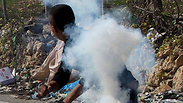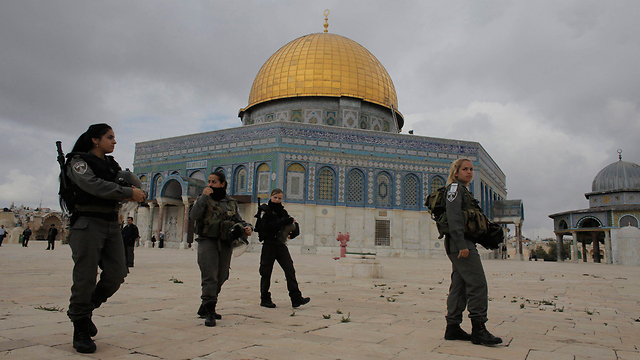
'The security forces' presence should be boosted, but not the in heart of hostile areas'
צילום: AFP
How to prevent a further escalation
Analysis: During the second intifada, it took the defense establishment a year and a half to find the right formula to quell the violence. Today, there are six things that can be done.
The rise in terrorism in the past week urgently raises the question of what can be done to prevent the third intifada.

Alongside the experienced-based explanations – which are mostly right – that "it's their fault," meaning the Islamic State, Mahmoud Abbas, Hamas, the Islamic Movement and everyone else, we should focus on what can be done.
This is not an easy challenge, especially when there is a clear contradiction between the pressure to restore security immediately and the need to examine the situation in a level-headed manner.
We should remember that during the second intifada, it took the defense establishment a year and a half to find the right formula - a combination of Operation Defensive Shield and building the separation fence.
So what should be done today? The first thing is to boost the presence of army and police forces - at this stage the forces' job would be to defend the Jews and provide a sense of security. It would be wrong to send them to the heart of a hostile area, be it in Judea and Samaria or East Jerusalem, or even the heart of Israel's Arab villages. That kind of presence creates friction and unnecessary entanglements and achieves the opposite of the desired outcome.
On the other hand, more proactive and offensive action requires intelligence-gathering, planning and focused efforts – and for that we need days, if not weeks for effective implementation. So despite the pressure, we must exercise patience.
Second, we must completely halt Palestinian laborers' entry to Israel, and conduct a thorough examination of three things: Who gets entry permits; the breaches in the fence (which have increased since 2004); and all the arrangements with Israeli employers and transport providers.

Security forces on Temple Mount. 'Why did it take the prime minister so long to say there is no intention of changing the status quo?' (Photo: Reuters) (צילום: רויטרס)
The third step is to prevent a situation in which we return to trading blows with Gaza. Operation Protective Edge created deterrence, but it's insufficient on its own. Gaza's residents are waiting for stage B – the beginning of the Strip's reconstruction. The talks about it, which should have begun two months ago, are not happening. It is in our best interests to convince the Egyptians and other elements to set these talks in motion soon, otherwise the achievements of Protective Edge will also go down the drain.
The fourth thing that must be done is to ensure that the police carry out quick, thorough investigations with full transparency, and are prepared to present them to the public. If mistakes have been made, they must admit it, while at the same time fully backing those who are risking their lives in difficult situations. There is no contradiction between the two. Quite the contrary.
The fifth thing, nevertheless, is the need to change the way we speak. We might have been in a calmer situation if the prime minister had said the right things at the right time and in the right way. For example, after the murder of the Palestinian teen from Shuafat, Benjamin Netanyahu should have addressed the issue publicly, like he did after the murder of the three Jewish teens.
The riots on the Temple Mount and the killings came in the wake of a rumor that Israel was planning to change the status quo at the site, and maybe even keep the Muslims away from there. Despite the rumors, there is no such intention. So why did the prime minister only say it a week ago, reluctantly, and only after pressure from Jordan? It's clear that had Israel issued an unequivocal official statement a month ago, promising that there would be no change, at least some of the tensions would have dissipated.
In the reality in which we are living, we must also convey other messages – rather than just get angry and threaten everyone.
A sixth thing that needs to be done, while dealing with the urgent things, is a reassessment of the policy on Jerusalem. There are dozens of old statements that do not match the changing reality, like neighborhoods such as the Shuafat refugee camp becoming part of the city.
And what about moves towards a peace agreement? Unfortunately, there is no real hope for that right now, and we should not base the solution to the security situation on that.










